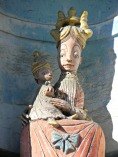 The United Nations Commission on the Status of Women is “the principal global intergovernmental body exclusively dedicated to the promotion of gender equality and the empowerment of women,” (www.unwomen.org). Each year in the early spring is a two-week colloquium that brings world leaders together to assess progress on targets and goals addressing these issues. During UNCSW, there are parallel events organized by NGOs (non-governmental organizations), free and open to the public, on a wide variety of topics. By attending the parallel events, you gain a deeper understanding of issues with impact on women and girls in the U.S. and around the world, as well as hearing about exciting initiatives and meeting inspiring leaders. Additionally, there are creative, moving ecumenical worship services each morning to bring women of faith together and bathe the experience in prayer.
The United Nations Commission on the Status of Women is “the principal global intergovernmental body exclusively dedicated to the promotion of gender equality and the empowerment of women,” (www.unwomen.org). Each year in the early spring is a two-week colloquium that brings world leaders together to assess progress on targets and goals addressing these issues. During UNCSW, there are parallel events organized by NGOs (non-governmental organizations), free and open to the public, on a wide variety of topics. By attending the parallel events, you gain a deeper understanding of issues with impact on women and girls in the U.S. and around the world, as well as hearing about exciting initiatives and meeting inspiring leaders. Additionally, there are creative, moving ecumenical worship services each morning to bring women of faith together and bathe the experience in prayer.
American Baptist women frequently attend at least part of UNCSW. In 2016, AB Women’s Ministries national coordinator of Mission with Women and Girls, Bonnie Sestito, executive director Virginia Holmstrom, associate executive director Rev. Sandra Hasenauer, and national director of American Baptist Women in Ministry/Transformation Ministries, Rev. Dr. Patricia Hernandez, attended several days of the event. These participants learned about pornography and its connection to sex trafficking and violence against women; the vulnerability of refugee and stateless women to violence and trafficking; how women in disadvantaged communities are working together towards peace and justice; opening doors through interfaith dialogue, and more. Through conversations at the end of the day, they came to the conclusion it was imperative they share what they were learning with the wider audience of American Baptist women.
 In 2015, the United Nations assess the progress that had been made on it’s 15-year Millennium Development Goals initiative begun in 2000. Although significant progress had been made in many areas, there is obviously still more work to be done. Therefore, the UN launched “Transforming Our World: The 2030 Agenda for Sustainable Development.” The 2030 agenda has 17 Sustainable Development Goals, or SDGs, to “end poverty, protect the planet, and ensure prosperity for all,” (www.un.org/sustainabledevelopment/sustainable-development-goals/).
In 2015, the United Nations assess the progress that had been made on it’s 15-year Millennium Development Goals initiative begun in 2000. Although significant progress had been made in many areas, there is obviously still more work to be done. Therefore, the UN launched “Transforming Our World: The 2030 Agenda for Sustainable Development.” The 2030 agenda has 17 Sustainable Development Goals, or SDGs, to “end poverty, protect the planet, and ensure prosperity for all,” (www.un.org/sustainabledevelopment/sustainable-development-goals/).
Although many of these issues may seem overwhelming and, in some cases, “far away,” there are many ways that congregations or women’s and girls’ ministry groups can become engaged in the betterment of our global neighborhood. To that end, American Baptist Women’s Ministries has posted information on our website about the SDGs and has ideas or other resources available to help you think through how you or your faith community could work on these issues locally as well as globally. (Lose this link? Just go to http://www.abwministries.org and hover your cursor over “Mission Focus.” It’s one of the options in the drop-down list that appears.)
May God bless our efforts to care for our world and all who inhabit it. Amen.



















